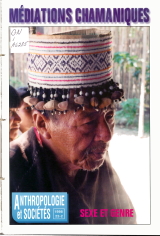 Résumé / Abstract Résumé / Abstract
Mariage mystique et pouvoir chamanique chez les Shipibo d'Amazonie péruvienne et les Inuit du Nunavut canadien
Les auteurs adoptent une approche ethnographique néo-comparatiste pour étudier les médiations chamaniques chez deux peuples autochtones des Amériques. Ils s'intéressent tout d'abord à la sexualité onirique entre les esprits et les humains, puis aux relations de parenté (alliance et filiation) des chamanes avec leurs esprits auxiliaires. Ces relations sont une source de pouvoir, soit qu'elles déterminent de nouveaux destins chamaniques, soit qu'elles consacrent la fin de l'apprentissage et le pouvoir de médiation des grands chamanes avec les esprits. Le travestissement, perceptible aux sens ou symbolique, et l'androgynie expriment la capacité des chamanes à chevaucher toutes les frontières.
Mots-clés : Saladin d'Anglure, Morin, chamanisme, sexe, genre, travestissement, androgynie, rêve, mariage mystique, Amazonie, Shipibo, Arctique, Inuit
Mystical Marriages and Shamanistic Powers among the Shipibo of Amazonia (Peru) and the Inuit from Nunavut (Canada)
The authors adopt a neo-comparatist ethnographic approach to study cases of shamanistic mediation in two aboriginal peoples of the Americas. They first look into dream sexuality between spirits and humans, and then into the kinship (by marriage and descent) of shamans with their helping spirits. These relationships are a source of power. They may engender future shamans or they may sanction the end of the learning period and consecrate the mediating power of great shamans with the spirits. Shamans can cut across all boundaries through androgyny and through transvestism, be it symbolic or concrete (i.e., its outward signs can be seen, heard or smelled).
Key words : Saladin d'Anglure, Morin, shamanism, sex, gender, transvestism, androgyny, dreams, mystical marriage, Amazonia, Shipibo, Arctic, Inuit
|

